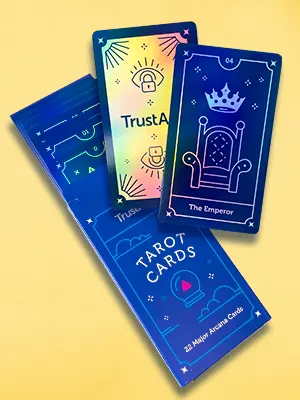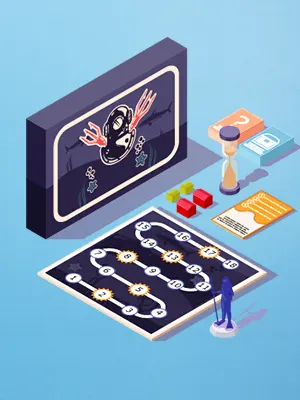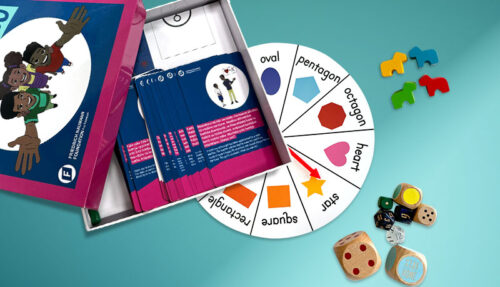We take an unbiased look at the pros and cons of self-publishing vs pitching your board game to a publisher

A lot of game designers who come to us for printing and manufacturing their own board games are amateurs. Amateurs in the sense that they’re doing it for fun as a passion project or just to share among a small group of their friends or with their local gaming club; not in the sense of not being much good. Many of them are really good at game design and we’ve had some awesome, innovative games pass through our press. But others — and we’re guessing you, if you’re reading this — have more entrepreneurial ambitions.
And if you’re thinking about developing a game with a view to making a business out of it and turning your genius into profits, sooner or later you’ll need to ask yourself, is it better to self-publish your board game or pitch to a game publisher? Ah, how we wish we could just say yes or no one way or the other. But we can’t. Why? Because it’s so much more complicated than that.
Every day, game developers find success by selling their ideas and prototypes to mainstream international game publishers. You know, big names like Asmodée Editions, Goliath, Hasbro, Ravensberger, and Grand Prix. Others make big bucks and garner a dedicated following by setting up their own small-scale games companies or going solo as self-publishers. And it works both ways: every day, a ton of aspiring game developers get rejected by the big names, just as hopeful independents lose money hand over fist and wish they’d kept the day job.
So, how do you decide which way to go? Pitch or self-publish? Self-publish or pitch? As we said, we can’t answer that question for everyone because it comes down to a personal decision based on your skills, experience, ambitions, and budget. But drawing on our experience with the industry, we can definitely lay out the pros and cons of each option. And with the cards on the table, fairly dealt, you can decide for yourself how you want to play your hand. Either way — just like in any other game — while smart planning and a clear strategy can stack the odds in your favor, there will always be an element of luck.
Let’s dive in.
The pros of self-publishing your board game
Complete creative freedom
We work with independent creative people every day of the week: academics, writers, marketers, photographers, artists, illustrators, graphic designers, and game developers just like you. And we like to think we’re pretty creative ourselves, too. One thing we understand is the importance of creative freedom and having control over your project.
When you self-publish or build your own startup, you keep that vital creative control. You’ll hear so many horror stories of game developers in despair as the beautiful idea they spent months or years perfecting— and just sold to Faceless Corporation, Inc. — gets so mangled in the publishing process that they don’t recognize the finished product. But with no wiseguy business executives eager to stick their thumbs in your pie, you avoid that kind of nightmare and retain complete control over your creative brainchild. And you also get to keep all the pie.
Build your own trusted team
As the poet John Donne wrote, “No man is an island”. Yeah, we know, that’s not very inclusive and maybe “no person is an island” would’ve been better, but the old wordsmith snuffed it back in the 17th century and didn’t know better. Gender issues aside, he had a good point. Even as an independent self-publisher, you’ll need other people on board to help you realize your board game concept.
You’ll almost certainly need an artist/illustrator, a graphic designer, and a canny crowd of keen play testers; not to mention a reputable printer with a ton of experience in game manufacture (we wave and say “Hi” here!). When you sell to a major company, you sacrifice the rights to choose any of these people. No matter how hard you’ve worked on your concept and design beforehand, the company will make ‘improvements’ and the team that makes them will be strangers to you.
On the flip side, as an independent creative aiming to self-publish a board game, you get to pick and choose the people with whom you collaborate. That can make a massive difference to the quality of the experience, your working relationships, the fun you have, the say you get over what goes, and the speed of production. It also means you can hire and fire until you pull together your personal dream team. You’re the boss, not the lackey.
Your name on the box
As an as yet unknown game developer, you can more-or-less forget fame even if you make a fortune with a mainstream game publisher. The chances of your name being anywhere anyone will see it are zero. Zilch. Nada. On the other hand, when you self-publish a board game, you can slap your name where it belongs, right on the box. You’ll get credit for your creativity. And if your game is a success, you’ll get the credit you deserve for that, too.
You get to bank
When you play the self-publishing game, you get to bank all the profits. Every dollar and doubloon, every escudo, guilder, ducat, florin and all the lucre are yours to keep. Well, until you earn enough to attract the interest of the IRS, anyway.
If you get hitched as an in-house developer, you’ll get a salary. The average game developer salary at entry level in the US is about $80,000 a year. That might seem appealing to you depending on your current circumstances, but even if you can snag a salaried position, you can kiss goodbye to creative control. Still, you’ll probably get dental; for that smile to hide your tears. When you sell your game to a company as a freelance, you get a royalty payment of about 5% on each game sold. The rest goes… yup, to the company.
Most game developers — unless mommy or daddy happens to own the company — start out as freelancers. Most freelancers either give up or stay freelancers with a job on the side. The other option is to self-publish and freelance. Either way, the money is yours if you successfully self-publish. We italicized that word for a reason. There are no guarantees. Which brings us to…
The cons of self-publishing your board game
Self-publishing is a business proposition, not a game
If you don’t have a head for business, some knowledge of marketing, and the capital (time and money) to put into promoting your board game, you stand little chance of selling any units. It’s a business, after all, not a game. But we’ll assume that you either have these skills — as you’re interested in self-publishing a board game — or that you’re keen to invest time, and maybe money, in learning them.
The independent time-suck vortex
As a creative, what you like to do best is… well, get creative, right? As a game developer your passion is for games — playing existing games and inventing new ones. But if you want to make money as an independent board game publisher, you need to spend a ton of time running your business: marketing, promoting, managing your website, networking on social media, writing your blog, going to trade fairs and conventions (not to play, but to lay out your stand), taking orders, packaging and mailing to customers, dealing with questions and complaints, chasing up invoices, keeping books, doing accounts, filling in tax forms, and more besides.
Throwing your family and all the demands of daily life into the mix, and you may wonder how the heck-a-roo you’ll find time to design and develop games. Now, it can be done. We pointed out right at the top that plenty of folks do it. And they love it. But those folks have certain personality traits, skill sets, support networks, and the ability to produce reliably good games that other people are keen to fork out their hard-earned dollars to own.
The question is, when thinking is it better to self-publish a board game or pitch to a game publisher, do you have those traits and skills? If the answer is yes, go for it. If not, maybe you can develop and learn the necessaries. But if it’s a definitive no and your brain is boiling just at the idea of everything that’s involved, developing a prototype to pitch to a publisher may be better for you. So, let’s take a look at the pros and cons of mainstream board game publishing.
The pros of selling your board game to a publisher
Let’s imagine that your feet are starting to feel a little on the chilly side now that you’ve looked into self-publishing your board game. So, you’ve decided to look into pitching your prototype to a mainstream — maybe international — board game publisher. What might be the advantages?
Freedom to make your next game
We’ve said that you’ll lose complete creative control over your project and your publisher will make changes and improvements whether you agree with them or not. We’ve heard the horror stories. But that doesn’t mean that you lose all creative freedom. When the company handle all the production, promotion, marketing, sales, and distribution, you’re free to do what you love best and start work on your next ingenious game idea.
You could end up with a better game
The socials and forums are awash with the grumblings of disgruntled game developers who feel their game got mangled by the publisher. But people rarely hit the boards when they’re happy, only when they’ve an ax to grind. So, all those negative voices can give a false idea of what most people experience.
Often, the changes a publisher makes can improve the game itself and will almost certainly boost sales. After all, they’re not trying to mess your game up or doing it to be mean. They know the industry and the market demands inside out, that’s all. And while you’re in the business of creating board games, they’re in the business of selling them. Remember how hard it might be to get any sales at all as an independent? Well, 5% of mainstream sales may not be much, but 100% of nothing ain’t more!
You’re on the first rung of a ladder and the only way is up
Once you’ve sold one idea — even if the board game never quite makes production or is only a moderate success — it will be a lot easier to sell the next one. You’ve taken a huge step onto a career ladder that could lead to new opportunities in the future. Once you’ve a few board game successes under your belt, you’ll have built trust and the company may cut you a little more creative slack.
When a vacancy comes up in-house, you’ll stand a better chance than most of getting the position if that’s what you want if the company know and trust you as a regular freelancer. Not only would an in-house job mean a regular salary, insurance and bonuses; but you might also get the chance to work with some of the best game designers in the world.
The cons of selling your board game to a publisher
Stuck in a rut working for the man
Despite all the potential pros (and they’re only potential, remember) that itchy itch — the sacrifice of your creative autonomy — still needs scratching. And while yes, you’re on the first rung of a ladder, you could just as well be one of the masses of jobbing game developers who spend the whole of their careers on that rung and die dreaming of what might have been — even if they avoid the slippery snake ride to creative oblivion. From the big corporation’s point of view, you play by their rules or you’re out of the game. You may not even be a player anymore once you sell out to the corporation: you risk becoming nothing more than a pawn in someone else’s game; stuck in a rut, working for the man.
You’ll need skin like rhinoceros hide
Once you start pitching your board game ideas and prototypes to publishers, you’d be very lucky to get any positive feedback fast. You are way more likely to get rejected — and then rejected, rejected, rejected, and rejected again. To take all that rejection, brush it off, hang on to your confidence, and keep pitching needs a pretty tough skin. Tough as rhinoceros hide. Some guys — even now successful board game developers — were rejected for years before they got a break.
Prepare for feast and famine
Aside from the slender possibility of rolling a double six first time and leaping over the other meeples to land on the “$80,000 a year salary” square, freelancing for the big board game manufacturers is touch-and-go at the best of times. Unless you come up with a new blockbuster game a couple times a year, you’ll go from moderate royalties for a mid-range game to nothing and back again on a regular basis. Lots of freelance board game developers have other jobs, too. So, prepare for the long haul and get yourself ready for a feast and famine existence.
The ‘win condition’
We think that’s a fair assessment of the pros and cons of both options and a reasonable answer to the question we started with: is it better to self-publish a board game or pitch to a mainstream company? If the win condition of this particular game still isn’t clear to you, that’s because there’s no rulebook, and the board keeps changing. Each player has to find their own unique way to the end.
But if we haven’t put you off altogether, whether you go the self-publishing route or start pitching, you’ll need a professional looking prototype of your game to get you started. At Qin Printing, we combine bucket loads of experience and enthusiasm with the latest digital and offset technologies to offer a bespoke board game printing and components manufacturing solution for all your needs. Talk to us today. Chatting through your options is free, and we’ll happily give you a no-obligation quote for your project. The game is on. Your turn!









